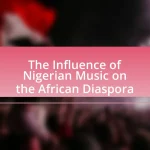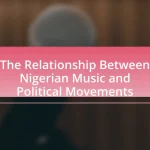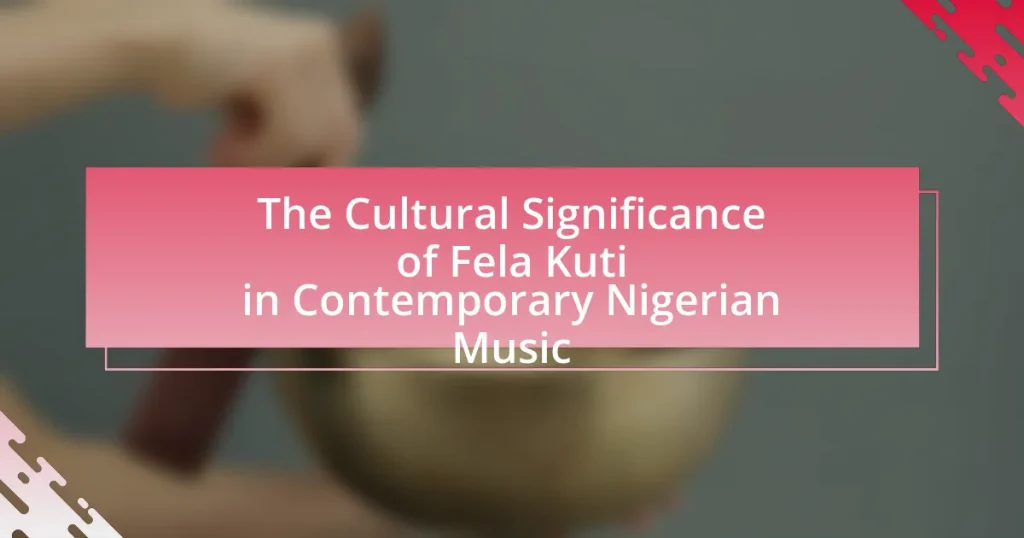Fela Kuti is a foundational figure in contemporary Nigerian music, renowned for creating the Afrobeat genre that merges traditional African rhythms with jazz, funk, and highlife. His music serves as a platform for social and political commentary, addressing critical issues such as corruption and human rights abuses in Nigeria. Kuti’s influence is evident in the works of modern artists like Burna Boy and Wizkid, who continue to draw from his legacy while incorporating themes of activism into their music. The article explores Kuti’s impact on the evolution of Nigerian music, his role as a political activist, and how contemporary musicians honor and navigate his legacy in today’s socio-political landscape.

What is the cultural significance of Fela Kuti in contemporary Nigerian music?
Fela Kuti is a pivotal figure in contemporary Nigerian music, known for pioneering the Afrobeat genre that blends traditional African rhythms with jazz, funk, and highlife. His music serves as a powerful vehicle for social and political commentary, addressing issues such as corruption, colonialism, and human rights abuses in Nigeria. Kuti’s influence extends beyond music; he inspired a generation of artists and activists who continue to use their platforms to challenge societal norms and advocate for change. His legacy is evident in the works of contemporary Nigerian musicians like Burna Boy and Wizkid, who incorporate elements of Afrobeat and social critique in their music, reflecting Kuti’s enduring impact on the cultural landscape of Nigeria.
How did Fela Kuti influence the development of contemporary Nigerian music?
Fela Kuti significantly influenced the development of contemporary Nigerian music by pioneering the genre of Afrobeat, which blends traditional African rhythms with jazz, funk, and highlife. His innovative musical style not only transformed the soundscape of Nigeria but also inspired a new generation of artists to incorporate social and political themes into their music. Kuti’s emphasis on lyrical content that addressed issues such as corruption, inequality, and human rights resonated with audiences, leading to a cultural movement that emphasized music as a form of activism. His legacy is evident in the works of contemporary Nigerian musicians like Burna Boy and Wizkid, who continue to draw from Afrobeat’s rich heritage while addressing modern societal issues.
What musical styles did Fela Kuti incorporate into his work?
Fela Kuti incorporated various musical styles into his work, primarily Afrobeat, jazz, funk, and traditional African music. Afrobeat, which he pioneered, blends these elements to create a unique sound characterized by complex rhythms, extended instrumental sections, and socially conscious lyrics. His music often featured influences from American jazz and funk artists, which he fused with traditional Nigerian rhythms and instrumentation, such as the use of horns and percussion. This combination not only defined his musical identity but also played a significant role in shaping contemporary Nigerian music and culture.
How did Fela Kuti’s lyrics reflect social and political issues in Nigeria?
Fela Kuti’s lyrics vividly reflected social and political issues in Nigeria by addressing corruption, government oppression, and the struggles of the Nigerian people. His songs, such as “Zombie,” criticized the military regime and its brutality, while “Sorrow Tears and Blood” highlighted the pain and suffering caused by political mismanagement. Kuti’s use of Afrobeat music as a platform for activism allowed him to reach a wide audience, making his messages about social justice and human rights resonate deeply within Nigerian society. His lyrics often included direct references to political figures and events, providing a powerful commentary on the socio-political landscape of Nigeria during his time.
Why is Fela Kuti considered a pioneer of Afrobeat?
Fela Kuti is considered a pioneer of Afrobeat because he created and popularized the genre by blending traditional African music with jazz, funk, and highlife. His innovative approach to music incorporated complex rhythms, socially conscious lyrics, and a large ensemble of musicians, which set the foundation for Afrobeat as a distinct genre. Kuti’s work in the 1970s, particularly with his band Africa ’70, showcased this fusion and addressed political and social issues in Nigeria, making his music not only entertaining but also a powerful form of activism. His influence is evident in the continued popularity of Afrobeat today, as many contemporary artists draw inspiration from his style and message.
What are the defining characteristics of Afrobeat music?
Afrobeat music is characterized by its fusion of traditional African rhythms, jazz, funk, and highlife, creating a complex and vibrant sound. This genre typically features extended instrumental sections, intricate polyrhythms, and a strong emphasis on groove, which encourages dance. Additionally, Afrobeat often incorporates socially and politically charged lyrics, reflecting the socio-political landscape of Nigeria, particularly through the works of Fela Kuti, who is a pivotal figure in its development. The instrumentation commonly includes a large ensemble with brass, guitars, keyboards, and percussion, contributing to its rich, layered texture.
How did Fela Kuti’s Afrobeat differ from other musical genres in Nigeria?
Fela Kuti’s Afrobeat differs from other musical genres in Nigeria primarily through its fusion of traditional African rhythms with jazz, funk, and highlife, creating a unique sound characterized by complex polyrhythms and extended instrumental sections. This genre also incorporates socially and politically charged lyrics, addressing issues such as corruption and human rights, which is less prevalent in other Nigerian music styles. Afrobeat’s emphasis on live instrumentation and improvisation further distinguishes it, as seen in Fela’s performances that often featured large ensembles and spontaneous musical exploration, contrasting with the more structured formats of genres like juju or highlife.
What role did Fela Kuti play in the Nigerian cultural and political landscape?
Fela Kuti was a pivotal figure in the Nigerian cultural and political landscape, serving as a voice for social justice and political activism through his music. His creation of the Afrobeat genre combined traditional African rhythms with jazz and funk, making his music a powerful medium for addressing issues such as government corruption, human rights abuses, and the struggles of the Nigerian people. Kuti’s lyrics often criticized the military regime in Nigeria, particularly during the 1970s and 1980s, leading to his arrest and harassment by authorities. His establishment of the Kalakuta Republic, a commune that served as a base for his artistic and political activities, further exemplified his commitment to challenging the status quo. Kuti’s influence extended beyond music, inspiring generations of artists and activists to engage in political discourse and cultural expression in Nigeria.
How did Fela Kuti’s activism influence his music and public persona?
Fela Kuti’s activism profoundly shaped both his music and public persona by integrating political themes and social commentary into his Afrobeat genre. His lyrics often addressed issues such as government corruption, police brutality, and the struggles of the Nigerian people, making his music a vehicle for social change. For instance, songs like “Zombie” criticized the Nigerian military, while “Sorrow Tears and Blood” highlighted the impact of political oppression. This bold stance not only resonated with his audience but also established him as a symbol of resistance against authoritarianism, enhancing his reputation as a revolutionary figure in Nigeria and beyond. Kuti’s commitment to activism was evident in his lifestyle, as he often faced government harassment and imprisonment, further solidifying his image as a fearless advocate for justice and human rights.
What impact did Fela Kuti have on subsequent generations of Nigerian musicians?
Fela Kuti significantly influenced subsequent generations of Nigerian musicians by pioneering the Afrobeat genre, which blends traditional African rhythms with jazz and funk elements. His innovative sound and politically charged lyrics inspired artists to address social and political issues through music, fostering a culture of activism within the Nigerian music scene. Notable musicians such as Burna Boy and Wizkid have cited Kuti as a major influence, incorporating elements of Afrobeat into their work while continuing his legacy of social commentary. Kuti’s impact is evident in the way contemporary Nigerian artists use music as a platform for expression and change, reflecting the ongoing relevance of his artistic vision.
How has Fela Kuti’s legacy been preserved in contemporary Nigerian music?
Fela Kuti’s legacy has been preserved in contemporary Nigerian music through the continued influence of his Afrobeat genre and the incorporation of his themes of social justice and political activism by modern artists. Contemporary musicians such as Burna Boy and Wizkid often cite Fela as a major inspiration, blending Afrobeat with other genres while addressing issues like corruption and inequality in their lyrics, similar to Fela’s approach. Additionally, the revival of Fela’s music through live performances and tributes, such as the Broadway musical “Fela!” and various tribute concerts, has kept his spirit alive in the cultural consciousness of Nigeria. This ongoing engagement with his work demonstrates the lasting impact of Fela Kuti on the evolution of Nigerian music and its socio-political discourse.
What modern artists draw inspiration from Fela Kuti’s work?
Modern artists such as Burna Boy, Wizkid, and Seun Kuti draw significant inspiration from Fela Kuti’s work. Burna Boy has openly acknowledged Fela’s influence on his music, particularly in blending Afrobeat with contemporary sounds, which is evident in his hit songs like “Ye.” Wizkid incorporates Afrobeat rhythms and themes reminiscent of Fela’s style in tracks like “Ojuelegba.” Seun Kuti, Fela’s son, continues his father’s legacy by performing and promoting Afrobeat, ensuring that Fela’s message and musical style remain relevant in today’s music scene.
How do contemporary musicians honor Fela Kuti’s contributions to music and culture?
Contemporary musicians honor Fela Kuti’s contributions to music and culture by incorporating Afrobeat elements into their music, addressing social and political issues through their lyrics, and performing tributes that celebrate his legacy. Artists like Burna Boy and Wizkid have explicitly cited Fela as an influence, blending traditional Afrobeat rhythms with modern sounds while using their platforms to discuss topics such as corruption and inequality, mirroring Fela’s activism. Additionally, events like the annual Felabration festival in Lagos serve as a tribute to his work, showcasing performances that reflect his impact on the music scene and cultural identity in Nigeria.
What challenges do contemporary Nigerian musicians face in the context of Fela Kuti’s influence?
Contemporary Nigerian musicians face the challenge of balancing artistic expression with commercial viability, heavily influenced by Fela Kuti’s legacy of political activism and social commentary. While Fela Kuti’s music encouraged boldness in addressing societal issues, many modern artists struggle to maintain this level of engagement without facing backlash from authorities or losing mainstream appeal. Additionally, the expectation to uphold Kuti’s standards of authenticity and cultural representation can create pressure, as seen in the rise of Afrobeats, which often prioritizes global market trends over deep-rooted messages. This tension between artistic integrity and commercial success reflects the ongoing impact of Fela Kuti’s influence on the current music landscape in Nigeria.
How do socio-political issues affect the music industry in Nigeria today?
Socio-political issues significantly impact the music industry in Nigeria today by shaping the themes and messages conveyed in songs. Artists often address corruption, governance failures, and social injustices, reflecting the realities of everyday life for many Nigerians. For instance, the rise of protest music, particularly among younger musicians, echoes the sentiments of movements like #EndSARS, which sought to combat police brutality and demand accountability from the government. This trend illustrates how socio-political contexts drive artists to use their platforms for activism, influencing public discourse and mobilizing listeners. Additionally, government censorship and regulation can restrict artistic expression, forcing musicians to navigate a complex landscape where their work can be both a form of resistance and a target for repression.
What strategies do artists use to navigate the legacy of Fela Kuti in their work?
Artists navigate the legacy of Fela Kuti by incorporating Afrobeat elements, addressing social and political issues, and using his music as a reference point for activism. Many contemporary musicians blend traditional Afrobeat rhythms with modern genres, creating a sound that pays homage to Kuti while appealing to new audiences. Additionally, artists often tackle themes of corruption, inequality, and resistance in their lyrics, reflecting Kuti’s own focus on social justice. For instance, musicians like Burna Boy and Wizkid have cited Kuti as an influence, using their platforms to raise awareness about contemporary issues in Nigeria, thus continuing his legacy of activism through music.
What can we learn from Fela Kuti’s approach to music and activism?
Fela Kuti’s approach to music and activism teaches the importance of using art as a platform for social change. He combined Afrobeat music with politically charged lyrics to address issues such as corruption, human rights abuses, and social injustice in Nigeria. Kuti’s music served not only as entertainment but also as a powerful tool for mobilizing public opinion and inspiring activism, exemplified by his song “Zombie,” which criticized the Nigerian military. His fearless stance against oppressive regimes demonstrates how artists can challenge authority and advocate for the marginalized, highlighting the role of cultural expression in political discourse.
How can contemporary musicians balance artistic expression and social commentary?
Contemporary musicians can balance artistic expression and social commentary by integrating personal narratives with broader societal issues in their work. This approach allows artists to maintain their unique voice while addressing relevant social themes. For instance, musicians like Fela Kuti used Afrobeat to critique political corruption and social injustice, effectively merging entertainment with activism. This method not only resonates with audiences but also fosters awareness and dialogue around critical issues, demonstrating that music can serve both as a form of personal expression and a vehicle for social change.
What best practices can emerging artists adopt from Fela Kuti’s career?
Emerging artists can adopt several best practices from Fela Kuti’s career, including the integration of social and political themes into their music, which fosters a deeper connection with their audience. Fela Kuti used his platform to address issues such as corruption and human rights abuses in Nigeria, making his music not only entertaining but also a form of activism. Additionally, artists should embrace their cultural roots and incorporate traditional sounds and instruments into their work, as Kuti did with Afrobeat, blending various genres to create a unique sound that resonates with both local and global audiences. Furthermore, maintaining artistic independence is crucial; Kuti famously resisted commercial pressures and stayed true to his vision, which allowed him to cultivate a loyal fan base. These practices highlight the importance of authenticity, cultural expression, and social responsibility in an artist’s career.














